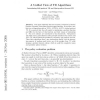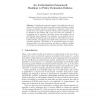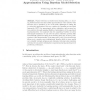141
click to vote
CORR
2012
Springer
13 years 9 months ago
2012
Springer
Bayesian priors offer a compact yet general means of incorporating domain knowledge into many learning tasks. The correctness of the Bayesian analysis and inference, however, lar...
125
click to vote
CORR
2006
Springer
15 years 2 months ago
2006
Springer
This paper addresses the issue of policy evaluation in Markov Decision Processes, using linear function approximation. It provides a unified view of algorithms such as TD(), LSTD()...
101
click to vote
ESORICS
2010
Springer
15 years 3 months ago
2010
Springer
Abstract. In distributed computer systems, it is possible that the evaluation of an authorization policy may suffer unexpected failures, perhaps because a sub-policy cannot be eval...
110
click to vote
ATAL
2008
Springer
15 years 4 months ago
2008
Springer
In reinforcement learning, least-squares temporal difference methods (e.g., LSTD and LSPI) are effective, data-efficient techniques for policy evaluation and control with linear v...
126
click to vote
CCS
2005
ACM
15 years 7 months ago
2005
ACM
Policy enforcement is an integral part of many applications. Policies are often used to control access to sensitive information. Current policy specification languages give users ...
118
click to vote
PKDD
2009
Springer
15 years 8 months ago
2009
Springer
Abstract. Feature selection in reinforcement learning (RL), i.e. choosing basis functions such that useful approximations of the unkown value function can be obtained, is one of th...
132
Voted
ICML
2006
IEEE
16 years 2 months ago
2006
IEEE
Policy evaluation is a critical step in the approximate solution of large Markov decision processes (MDPs), typically requiring O(|S|3 ) to directly solve the Bellman system of |S...



